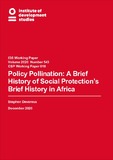Policy Pollination: A Brief History of Social Protection’s Brief History in Africa
| dc.contributor.author | Devereux, Stephen | |
| dc.date.accessioned | 2020-12-15T12:30:13Z | |
| dc.date.available | 2020-12-15T12:30:13Z | |
| dc.date.issued | 2020-12-15 | |
| dc.identifier.citation | Devereux, S. (2020) Policy Pollination: A Brief History of Social Protection’s Brief History in Africa, IDS Working Paper 543, Brighton: Institute of Development Studies, DOI: 10.19088/IDS.2020.004 | en |
| dc.identifier.isbn | 978-1-78118-734-0 | |
| dc.identifier.issn | 2040-0209 | |
| dc.identifier.uri | https://opendocs.ids.ac.uk/opendocs/handle/20.500.12413/15863 | |
| dc.description.abstract | The relatively recent emergence and sustained rise of social protection as a policy agenda in Africa can be understood as either a nationally owned or ‘donor-driven’ process. While elements of both can be seen in different countries at different times, this paper focuses on the pivotal role of transnational actors, specifically international development agencies, as ‘policy pollinators’ for social protection. These agencies deployed a range of tactics to induce African governments to implement cash transfer programmes and establish social protection systems, including: (1) building the empirical evidence base that cash transfers have positive impacts, for advocacy purposes; (2) financing social protection programmes until governments take over this responsibility; (3) strengthening state capacity to deliver social protection, through technical assistance and training workshops; (4) commissioning and co-authoring national social protection policies; (5) encouraging the domestication of international social protection law into national legislation. Despite these pressures and inducements, some governments have resisted or implemented social protection only partially and reluctantly, either because they are not convinced or because their political interests are not best served by allocating scarce resources to cash transfer programmes. This raises questions about the extent to which the agendas of development agencies are aligned or in conflict with national priorities, and whether social protection programmes and systems would flourish or wither if international support was withdrawn. | en |
| dc.description.sponsorship | National Research Foundation of South Africa | en |
| dc.description.sponsorship | British Council | en |
| dc.description.sponsorship | SOCIUM Research Centre on Inequality and Social Policy, University of Bremen, Germany | en |
| dc.language.iso | en | en |
| dc.publisher | Institute of Development Studies | en |
| dc.relation.ispartofseries | IDS Working Paper;543 | |
| dc.relation.ispartofseries | CSP Working Paper;018 | |
| dc.rights | This is an Open Access paper distributed under the terms of the Creative Commons Attribution Non Commercial 4.0 International licence (CC BY-NC), which permits use, distribution and reproduction in any medium, provided the original authors and source are credited, any modifications or adaptations are indicated, and the work is not used for commercial purposes. | en |
| dc.rights.uri | http://creativecommons.org/licenses/by-nc/4.0/ | en |
| dc.subject | Politics and Power | en |
| dc.subject | Social Protection | en |
| dc.title | Policy Pollination: A Brief History of Social Protection’s Brief History in Africa | en |
| dc.type | IDS Working Paper | en |
| dc.rights.holder | Institute of Development Studies | en |
| dc.identifier.team | Rural Futures | en |
| dc.identifier.doi | 10.19088/IDS.2020.004 | |
| rioxxterms.funder | Default funder | en |
| rioxxterms.identifier.project | Default project | en |
| rioxxterms.version | VoR | en |
| rioxxterms.funder.project | 9ce4e4dc-26e9-4d78-96e9-15e4dcac0642 | en |
Files in this item
This item appears in the following Collection(s)
-
IDS Research [1661]
Except where otherwise noted, this item's license is described as This is an Open Access paper distributed under the terms of the Creative Commons Attribution Non Commercial 4.0 International licence (CC BY-NC), which permits use, distribution and reproduction in any medium, provided the original authors and source are credited, any modifications or adaptations are indicated, and the work is not used for commercial purposes.


